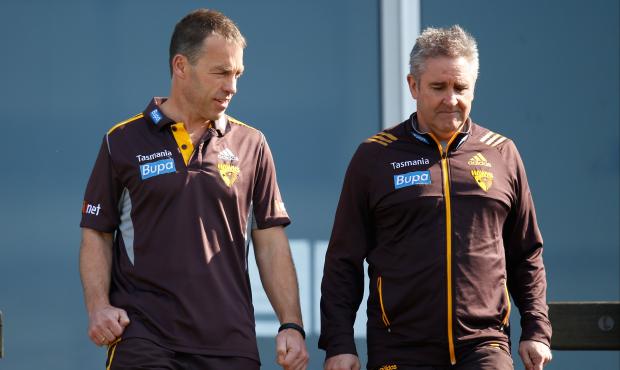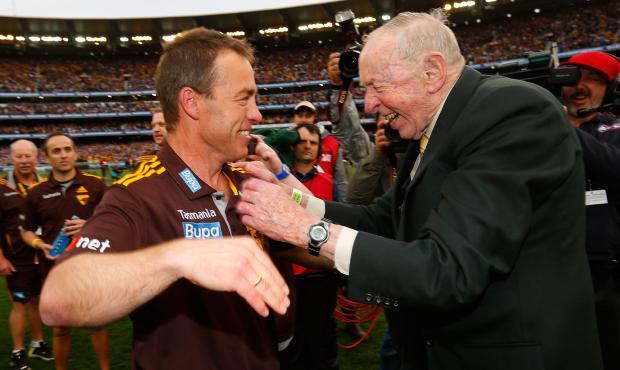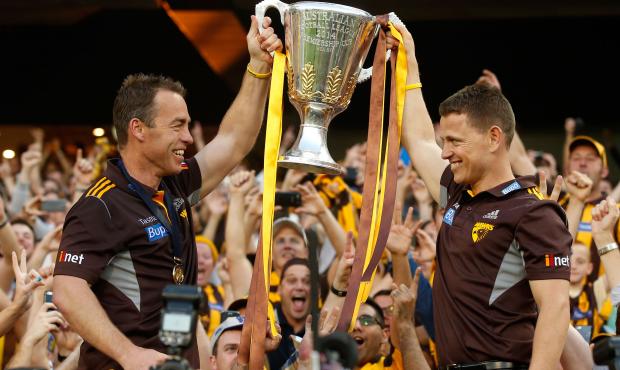THE PAGES of history would suggest that Alastair Clarkson's finest moments as coach of the Hawthorn Football Club were the premiership wins of 2008 and those between 2013 and 2015.
In masterminding the Hawks to four premierships in nine years, Clarkson joined the pantheon of the greatest coaches in AFL history.
But for all that, his greatest achievement may have come in the middle of the 2014, when he became seriously ill with Guillain-Barre syndrome and missed five games in the middle of the season.
While Clarkson convalesced, the Hawks didn't skip a beat. A team that was already missing several key players went unbeaten through that period with the then low-profile Brendon Bolton as the stand-in senior coach.
It was the culmination of a system and a culture installed by Clarkson over 10 years. The former pugnacious North Melbourne and Melbourne rover, so unknown in coaching ranks that when he won the Hawthorn coaching job many of his new players had to Google his name, built a teaching and coaching structure that long-time lieutenant Chris Fagan described as a "football university".
It is actually a dual milestone for Clarkson when the Hawks play Fremantle at Domain Stadium on Saturday night. It is his 300th game as coach of the Hawks as well as surpassing John Kennedy snr to become the club's longest-serving coach. But Clarkson remains so in awe of the legendary Kennedy – his first coach at the Kangaroos – that he begged off speaking to the AFL Record to mark the occasion out of deference to him.
• The Chase: Clarkson's milestone and why it matters
They share some similarities. Both were trained as teachers. Kennedy was a high achiever in education as well as football and served as a secondary school principal before becoming a senior bureaucrat in the Victorian education department. Clarkson taught physical education at the prestigious Wesley College before studying full-time for a Masters of Business Administration at Monash University. The coaching bug bit after that.
When he joined the Hawks at the end of 2004, he inherited a mess, with a playing list notable for its overpaid underachievers. He undertook a serious culling of the list and invested heavily in the draft and, surrounded by a new-look coaching staff with backgrounds in education and football, he set about establishing a culture of excellence with a strong basis in teaching.
When Fagan (a former teacher) came on board as director of coaching at the start of 2008 he found a high-achieving environment was already taking shape. Clarkson, together with Mark Evans (another former teacher) as head of football had done the hard yards with the coaching staff, the just-retired Richie Vandenberg had helped instill some new values among the playing group and the Hawks were on their way. "When I got there the approach was a bit more collaborative, particularly with the coaching of the players, and by 2008 that was the norm," Fagan told the AFL Record.
Alastair Clarkson and his long-time football manager Chris Fagan. Picture: AFL Photos
The result was a stunning premiership flag in 2008. After that, the Hawks became a destination club on and off the field, which was what attracted Bolton (yep, another former teacher) to the club from Tasmania, where he had been a decorated player and coach. "My first impression of Hawthorn was a real, dogged determination to retain high standards," said Bolton who is now in his second season as coach of Carlton. "The detail was important."
Adam Simpson came aboard in 2010, within a few weeks of ending his brilliant 306-game playing career with North Melbourne and was struck by the "high-end intelligence" Clarkson had surrounded himself with.
"Not just the assistant coaches," noted Simpson, who became West Coast's coach in 2014. "But strength and conditioning, analytics and sports science as well. Those sorts of areas were made up of clearly well-educated and thoughtful people who knew what their purpose was."
Twelve months later, Leon Cameron joined the Hawks from the Western Bulldogs where he had been an assistant coach for six years. He was keen to broaden his football education and Hawthorn appealed because it was becoming a large and powerful club and because of Clarkson.
"The one thing that reinforced why I wanted to go and was lucky enough to get there was that the professionalism was very good. The surprising thing was how he taught he his players and used his assistants to teach his methods," said the now senior coach of Greater Western Sydney.
Notice a thread here? Hawthorn had become the place to go if you wanted to become a senior coach. The team success was one thing; clubs seeking new senior coaches look towards those that have helped shape recent premierships. But Clarkson had become the AFL's coach whisperer and his club the finishing school.
• Clarko's eight biggest coaching calls
Damien Hardwick became the first Clarkson disciple to become a senior coach when he joined Richmond in 2010. But check out the Hawthorn coaching staff in 2012. Clarkson sat atop the tree, with Fagan as his director of coaching. Line coaches Simpson, Bolton, Cameron and Luke Beveridge (who joined that year) would all become senior coaches, as did Fagan. When Cameron left for the Giants at the end of 2012, in came Brett Ratten, fresh off more than five years as coach of Carlton. In 2012 and 2013, the Hawks were in the care of Clarkson and five past or future AFL senior coaches.
"It was a fantastic place to be," Fagan recalled. "The footy intellect was remarkable because they all brought to the club a wide range of experiences and we were able to tap into everyone's ideas at different times to produce the outcomes that we did, teams that made Grand Finals and won premierships. We learned off each other."
Continued Bolton: "Every year I was at Hawthorn we travelled and looked for the one percenters we could find from other sports."
Hawthorn was the best team in 2012, but the post-season review concluded that the Hawks could do better in close finishes and needed to kick better for goal. Inaccuracy arguably cost the Hawks the Grand Final that year against the Sydney Swans.
The quest for learning took some of the coaches to the perennial NBA champions, the San Antonio Spurs. It was there that they learned how the Spurs regularly practised game scenarios for close games. Hence the idea for the constructing a countdown clock in the grandstand at Waverley Park was spawned. Perhaps the Hawks would not have finally overcome Geelong and the so-called Kennett Curse in the epic 2013 preliminary final without it.
The Spurs also charted every free throw taken by a player during practice and kept them on display for the players to see. The Hawks mimicked that. Every kick for goal before, during and after training is now recorded and the data shared with the players. When their percentages fluctuate wildly, they seek answers why.
"For the coaches, that sort of thing is a no-brainer but it was getting the players to buy in and educate them, and that's what Clarko is really good at," Simpson said. "Educating and instilling belief and that's the starting point for getting better."
2014 was the culmination of all that, but so was 2010. The Hawks won their first game but then lost the next six. The famed Clarkson's Cluster was dead and buried and so might have been Clarkson's time as coach of Hawthorn. President Jeff Kennett was on the warpath, poised to make a change. Had Sam Mitchell not tackled Richmond's Shane Tuck, who was running into kick the match-winning goal in round eight, he might have been cleaning out his desk the following morning.
Clarkson changed the game plan almost overnight. The elite kicking game that would become the key ingredient of the three-peat premierships was first implemented and the Hawks ended up making the finals after their 1-6 start. "It was quite an amazing feat to change the game plan during the season and to convince the players to go about things in a different way," Fagan said. "He got some great results under considerable adversity. To see the way forward under that type of pressure was definitely one of his great moments."
Another was after the 2012 Grand Final. First at the post-match media conference and then at the club dinner later that evening, Clarkson brought a sense of calm and perspective. Much of the country was reeling following the shocking and senseless murder in Melbourne of Jill Meagher the week of the game and Clarkson managed to make the result of the biggest game of the year seem insignificant.
"To have the foresight to say, 'let's put it in perspective and grow from it', to do that within a few hours of a game is really tough to do," Simpson said. "He had good guidance or good gut feel because he did a super job with that."
Added Cameron: "In the inner sanctum of a footy club there's this togetherness and he addressed the situation within half an hour after the game."
Not that the result didn't burn.
"They then went on to win the next three flags," Cameron said.
The 2013 flag was seen by the Hawks as redemption. The preliminary loss to Collingwood in 2011 and the Grand Final stumble the next year left the Hawks branded as chokers in some quarters, so the relief was palpable following the grinding win over Fremantle.
Clarkson and John Kennedy celebrate Hawthorn's 2013 premiership. Picture: AFL Photos
The next year was when the Clarkson's influence on the Hawks was at its most profound. His illness could not have come at a worst time with Brian Lake, Sam Mitchell, Cyril Rioli and Josh Gibson already out of the team due to significant injuries.
The Hawks had no senior assistant coach as such but by virtue of being his longest-serving lieutenant at the time, Bolton was handed the reins for the games against Greater Western Sydney, West Coast, Carlton, Collingwood and Gold Coast, which the Hawks all won.
"It was a reflection of the system we created," said Bolton of those few weeks. "Chris Fagan was helping the coaches but really, the system was able to rely on all of us. There was no ridiculous change taking place and all the coaches had the capacity to have their say in what we did."
The 2014 Grand Final was as close to perfection as football can get. The Hawks went in as significant underdogs, yet crushed the Swans by 63 points in a result made all the sweeter by Lance Franklin's defection from the Hawks to the Swans 12 months earlier.
"In my time at Hawthorn that was the greatest performance I had seen," Fagan said. "Both the players and the coaches were comprehensively brilliant in every facet of the game against a super team."
Added Bolton: "That sort of game doesn't happen very often. It was as complete a game I have been involved with when it comes to a strategy being implemented from the start to the finish."
Clarkson, (l) with assistant Brendon Bolton and the 2014 Toyota AFL Premiership Cup.
Cameron was two years removed from the Hawks by then, yet nothing surprised him that day, nor 12 months later when the Hawks beat Simpson's West Coast for their third straight flag.
"I didn't think they'd win three in a row but each time they got there I thought they'd win. They were always in the best two or three teams each year and they'd win a lot of games because they were so well drilled. They recruited well, (were) coached well and managed their list well."
Clarkson's DNA is spread far and wide though the AFL. Six of his senior coaching rivals worked under him at the Hawks and there may soon be more, with John Barker knocking on the door. He helped reshape the AFL Coaches Association and revitalised the International Rules series, but most significantly, he engineered Hawthorn's second golden era. Not bad for a pint-sized rover who as a player could best be described as 'average'.
"Clarko played footy hard and tough," Cameron concluded. "How he coached his players was hard and tough and when I walked in the door you could see that. He doesn't accept people who aren't going to play hard and tough and with that comes the third thing, the amount of spirit and energy, getting everyone to play hard and tough footy and that comes through the way he trained his players and spoke to his players."
It's the Kennedy way and the Hawthorn way. Adapted for the 21st century.
This article also appears in this weekend's edition of The AFL Record, available at all grounds.


